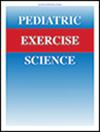年龄、性别和培训对跨教育培训的特定影响。
IF 1.3
4区 医学
Q3 PEDIATRICS
引用次数: 0
摘要
大量出版物对成人的交叉教育效果进行了研究,主要调查对侧同源(相同)肌肉。关于交叉锻炼对对侧异源(不同)肌肉和年龄(青少年与成年人)影响的研究要少得多,也没有关于性别差异的研究。因此,我们的目标是比较女性和男性青年及青壮年对对侧同源肌肉(胸压肌[CP]、肘关节屈伸肌、手握等长力量和铅球)和异源肌肉(腿压肌、伸膝等长力量和反向跳跃)的交叉锻炼效果。对 28 名成年女性、28 名青年女性、28 名成年男性和 28 名青年男性(共计 112 人)进行了为期 8 周(每星期 3 节课)的单侧优势臂 CP 训练计划前后的检查。单侧测试评估了优势腿和非优势腿的压腿和 CP 1 次重复最大值、膝关节伸肌、肘关节伸肌、肘关节屈肌和手握最大自主等长收缩(MVIC)力量,以及铅球距离和反向运动跳跃高度。单侧CP训练可提高训练特异性(CP 1次重复最大值)和非特异性(肘关节伸肌、肘关节屈肌、手握MVIC力量和铅球距离)(P < .04,η2:.45-.85),但对下半身没有明显改善。测试肢体特异性的证据显示,优势臂的训练收益明显高于非优势臂(P < .021,η2:.17-.75)。青少年的训练适应性超过了单侧CP 1次重复最大值、肘关节伸肌MVIC力量和铅球距离(P < .049,η2:.14-.49)。性别主效应差异不明显。总之,交叉教育具有训练针对性(上半身和优势肢体的收益最大),对青少年的益处更大,除肘伸肌MVIC外,一般没有性别差异。本文章由计算机程序翻译,如有差异,请以英文原文为准。
Age, Sex, and Training Specific Effects on Cross-Education Training.
An extensive number of publications have examined cross-education effects with adults, primarily investigating contralateral homologous (same) muscles. There are far fewer investigations on cross-education effects on contralateral heterologous (different) muscles and age (youth vs adult) and no studies investigating sex differences. Hence, the objective was to compare cross-education in female and male youth and young adults to contralateral homologous (chest press [CP], elbow flexors and extensors, handgrip isometric strength, and shot put) and heterologous (leg press, knee extension isometric strength, and countermovement jump) muscles. Twenty-eight female adults, 28 female youth, 28 male adults, and 28 male youth (total: 112) were examined before and after an 8-week (3 sessions/wk) unilateral, dominant arm, CP training program. Unilateral testing assessed dominant and nondominant leg press and CP 1-repetition maximum, knee extensors, elbow extensors, elbow flexors, and handgrip maximum voluntary isometric contraction (MVIC) strength, as well as shot put distance and countermovement jump height. Unilateral CP training induced training specific (CP 1-repetition maximum) and nonspecific (elbow extensors, elbow flexors, handgrip MVIC force, and shot put distance) improvements (P < .04, η2: .45-.85) but no significant lower body improvements. There was evidence for testing limb specificity as the dominant arm provided significantly (P < .021, η2: .17-.75) greater training gains than the nondominant arm. Youth's training adaptations exceeded with unilateral CP 1-repetition maximum, elbow extensors MVIC force, and shot put distance (P < .049, η2: .14-.49). No sex main effect differences were apparent. In conclusion, cross-education was training specific (greatest gains with upper body and dominant limbs) with greater benefits for youth and generally no sex differences with the exception of elbow extensors MVIC.
求助全文
通过发布文献求助,成功后即可免费获取论文全文。
去求助
来源期刊

Pediatric Exercise Science
医学-生理学
CiteScore
2.80
自引率
0.00%
发文量
33
审稿时长
>12 weeks
期刊介绍:
Pediatric Exercise Science is a journal committed to enriching the scientific knowledge of exercise during childhood and adolescence. To this end it publishes information that contributes to an understanding of (a) the unique aspects of the physiologic, physical, biochemical, and psychologic responses of children to exercise, (b) the role of exercise in the treatment of pediatric chronic diseases, (c) the importance of physical activity in the prevention of illness and preservation of wellness, and (d) the means by which participation in sports may be made safer and more enjoyable for children and youth. Consideration will be given for publication of work by various methodologies consistent with the scientific approach.
Besides original research, the journal includes review articles, abstracts from other journals, book reviews, and editorial comments. Pediatric Exercise Science encourages the expression of conflicting opinions regarding children and exercise by providing a forum for alternative viewpoints. At the same time it serves as a means of accumulating a base of research information that will allow application of experimental data to clinical practice. The scientific disciplines contributing to this body of knowledge are diverse. Therefore it is the purpose of this journal to provide a common focus for disseminating advances in the science of exercise during childhood. In doing so, the journal allows the opportunity for cross-fertilization of ideas between disciplines that will potentiate the growth of knowledge in this field. Pediatric Exercise Science seeks to stimulate new ideas regarding exercise in children and to increase the awareness of scientists, health care providers, and physical educators of the importance of exercise during childhood.
 求助内容:
求助内容: 应助结果提醒方式:
应助结果提醒方式:


